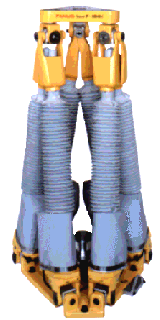machine#current_designs: hexapod
Hexapod
The portable machine tool of the future.
Related ideas:
robocrane:| A hexapod that uses flexible cables instead of ballscrews or hydraulic cylinders
hexegrity:| a compression frame supported by six adjustable tension members
hextatic:| a cheap prototype hexapod intended for distribution as a kit
News!
12/11/06: hextatic has been festering in its box; in the meanwhile i've managed to get hooked on the idea of a mini-hexapod "hex-chan" using pager motors, and draws power and commands off a USB bus! This will allow me to try out some of the ideas slated for the motherchip without getting bogged down in details. Hextatic is still under development as well, so don't worry.
Why a hexapod?
- The variable length struts all point directly towards the end effector. All force vectors are directly along a strut. There is only tension or compression, and no bending anywhere in the (ideal) structure. This leads to a very rigid and lightweight structure, similar in function to a geodesic dome.
- The total error is averaged over all six actuators, instead of accumulating error as in a stacked slide (milling machine) or serial rotary joint mechanism (robot arm). Similarly, wear is evenly distributed.
- All six actuators work together to move the platform, providing higher power/weight ratios since less time is spent idle per actuator. The high rigidity and low mass allow for very high acceleration rates, making feasible techniques such as high speed machining and active vibration compensation.
- The machine is composed of multiple identical parts, greatly simplifying manufacture, design, and repair.
- It is easily disassembled, shipped, and reassembled on-site. Machines with an enclosing frame (such as the ingersoll octahedral hexapod ) do not require heavy foundations or precision leveling.
Under construction. Sorry! Well, would you rather have me work on a real-life model, or sit here and write about what other people are doing?
pros cons workarounds build test reiterate
some ideas:
use an airmotor (or tesla_turbine) as the spindle drive motor, saving on mass, space, and heat buildup per spindle horsepower
tube-shaped ballscrews with internal tension and viscoelastic damping layer
new-ish
use roller_screws instead of ballscrews for efficiency and ease of construction
delrin ACME anti-backlash nuts for the cheap prototype
For a small prototype, I'm planning on using a rollerblade bearing u-joint for 2-dof linkages similar to what's found on the FANUC F-100i robot

- Fanuc F-100i robot
- The F-100i is capable of a static payload of 140kg in a vertical direction and 75 kg in a horizontal direction. It seems to be less than one meter tall, and weighs somewhere around 100 kg. It's not in production, unfortunately. It seems to have been eclipsed by the much less aesthetically pleasing
f-200iB:
http://www.fanuc.co.jp/en/product/robot/lineup/f200ib.html
The F-200iB has a functional work envelope in the shape of a cylinder, with diameter 500mm and height 300 mm, but the full work envelope is a complex lenticular shape about 1 meter in diameter and 500mm in height. Repeatability is within 0.2mm. The robot is 800-1300mm tall, 630mm in diameter, and weighs 190kg. It is capable of moving a 100kg payload, has a maximum speed of 1.5m/s, and is primarily intended for welding and assembly applications. Just to give you some idea of what the run of the mill hexapod is like.
originals from web archive:
Hexapods are also sometimes called (for your googling pleasure)
Stewart Platforms
Parallel Link Manipulators
Parallel Machine Tools
Geodetic machine tools
geodesic machine tools
octahedral hexapod
links:
Pictures of the NIST/Ingersoll prototype octahedral hexapod:
http://www.mel.nist.gov/photos/photo/phexa99.html
LME hexapod cad drawings, inspiration, hexapod design engineering software, code bits:
http://fenn.dyndns.org/pub/www.i-way.co.uk/~storrs/lme/LMEHexapodMachine.html
double ball bar procedure and calculations for a hexapod:
http://precnt.prec.kyoto-u.ac.jp/mmc/research/para/ishida/pa_ishida.html
parallel mechanisms info center. history, comparison, nomenclature
http://www.parallemic.org/
forward kinematics translation equations. fortunately we dont have to do this thanks to EMC (I think):
http://www.enee.umd.edu/medlab/papers/robautforsem97/robautforsem97.html
EMC. Enhanced Machine Controller. Linux realtime motion planner, cnc controller, step sequence generator, live/preview tool path , and more:
http://www.linuxcnc.org/
Hexel owns the trademark for "Hexapod." Fuzzybunnies. Thanks for raping the information commons, guys. Send them your hate mail:
http://www.hexel.com/
Most folk ignore "Hexapod" as a patented/trademarked word much the same way we ignore the "Windows" thing when we put clear panes of glass in our homes. If it becomes a problem with cash down the line, call it a Stewart Platform. That is well beyond the experation date.
University of Wyoming hexapod:
http://wwweng.uwyo.edu/electrical/research/hexapod/
University of Florida hexapod:
http://www.mae.ufl.edu/SAMM/Research/Manufacturing/manufacturing_main.html
Homemade DIY hexapod:
http://www.foxkid.net/cmm/platform/project-notebook.html
Another DIY hexapod:
http://robofac.sourceforge.net/screenshots.html
I am carefully avoiding any mention of "that other hexapod robot" that is really stupid and serves no purpose whatsoever. Also avoiding any terms that are commonly used to describe it, so that people searching and doing a NOT boolean operation won't cancel out this page.
mostly ideas generated by fenn
![[PukiWiki] [PukiWiki]](image/pukiwiki.png)
